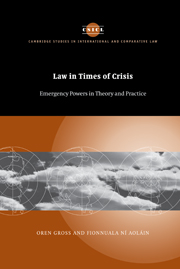Book contents
- Frontmatter
- Contents
- Acknowledgments
- Table of cases
- Table of treaties
- Table of legislation
- Table of international materials
- Introduction
- Part I
- 1 Models of accommodation
- 2 Law for all seasons
- 3 Models of extra-legality
- 4 Five degrees of separation
- Part II
- Bibliography
- Index
- CAMBRIDGE STUDIES IN INTERNATIONAL AND COMPARATIVE LAW
1 - Models of accommodation
Published online by Cambridge University Press: 03 September 2009
- Frontmatter
- Contents
- Acknowledgments
- Table of cases
- Table of treaties
- Table of legislation
- Table of international materials
- Introduction
- Part I
- 1 Models of accommodation
- 2 Law for all seasons
- 3 Models of extra-legality
- 4 Five degrees of separation
- Part II
- Bibliography
- Index
- CAMBRIDGE STUDIES IN INTERNATIONAL AND COMPARATIVE LAW
Summary
The discourse concerning emergency regimes in democratic societies has almost invariably been governed by models that may be grouped together under a general category that we call “models of accommodation.” All those models countenance a certain degree of accommodation for the pressures exerted on the state in times of emergency, while, at the same time, maintaining normal legal principles and rules as much as possible. According to the models of accommodation, when a nation is faced with emergencies its legal, and even constitutional, structure must be somewhat relaxed (and perhaps even suspended in parts). This compromise, it is suggested, enables continued adherence to the principle of the rule of law and faithfulness to fundamental democratic values, while providing the state with adequate measures to withstand the storm wrought by the crisis.
Classical models of accommodation
The Roman dictatorship
The institution of the Roman dictatorship is the prototype for all modern forms of models of accommodation. The Romans introduced a system in which an emergency institution was a recognized and regular instrument of government built into a constitutional framework. This institution was hailed by Niccolò Machiavelli as one that “deserves to be considered and numbered among those that were the cause of the greatness of so great an empire.”
- Type
- Chapter
- Information
- Law in Times of CrisisEmergency Powers in Theory and Practice, pp. 17 - 85Publisher: Cambridge University PressPrint publication year: 2006



